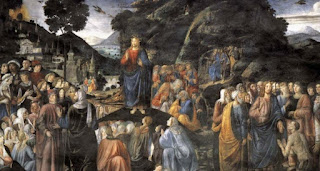Fifth Sunday of Lent: Cycle C - April 03, 2022
Readings: Isaiah 43:16–21; Psalm 126:1–6; Philippians 3:8–14; John 8:1–11
 |
| (Jesus and the sinful woman John 8:1-11) |
Whenever we think about the present or future, we fall back to the past, the history. During Lent, we have read a number of episodes from the Old Testament about how the God of the Israelites lead them in their journey. God had been their constant support and strength in spite of the terrible slavery they had to go through in Egypt. God called them out of Egypt and He chose Moses as their leader to bring them to the promised land. God gave them judges and kings, prophets and priests to make their life easier and eventful. The history of the Israelites was not an easy one, yet God made them stronger and more in number. Moreover, God was their leader and salvation in every stage of their lives both in good and bad times. People forgot Yahweh and His works of wonder. They struggled through sin and slavery, death and destruction, disease and annihilation, drought and deficiency, devil and wickedness, adversaries and anxieties, war and peace. In other words, the prophet Isaiah speaks in the first reading of today (Isaiah 43:16–21) very encouraging words. Even though they have to go through all these hellish things yet they have been alive and active. And there is a purpose as God says "the people whom I formed for myself, that they might announce my praise" (Isaiah 43:21).








